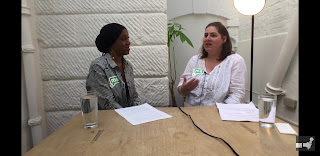Blogs, Vlogs & Lots of Dialogue: Where Have I Been?

Copyright: C King It's been over a year since my last post and, if you're missing this blog, you're probably wondering where I have been. To say that I have been been resting on my laurels would be an overstatement, given that I'm not very good at pacing. After months of home-schooling finally ended, I threw myself into supporting others, including advocating for them. I have been particularly busy in my advocacy work - guest blogging, filming, reporting, mentoring, public speaking. This year, I've also been a member of the All Party Parliamentary Group (APPG) for MS, which has been extremely interesting, and supporting others in navigating a health system which, whilst amazing, can be sometimes monolithic and uncommunicative at a time when some are going through the most difficult ...






